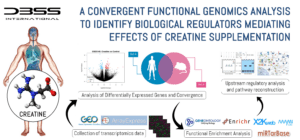Bonilla, D.A.; Moreno, Y.; Rawson, E.S.; Forero, D.A.; Stout, J.R.; Kerksick, C.M.; Roberts, M.D.; Kreider, R.B. A
Nutrients 2021, 13, 2521. https://doi.org/10.3390/nu13082521
Abstract
Creatine (Cr) and phosphocreatine (PCr) are physiologically essential molecules for life, given they serve as rapid and localized support of energy- and mechanical-dependent processes. This evolutionary advantage is based on the action of creatine kinase (CK) isozymes that connect places of ATP synthesis with sites of ATP consumption (the CK/PCr system). Supplementation with creatine monohydrate (CrM) can enhance this system, resulting in well-known ergogenic effects and potential health or therapeutic benefits. In spite of our vast knowledge about these molecules, no integrative analysis of molecular mechanisms under a systems biology approach has been performed to date; thus, we aimed to perform for the first time a convergent functional genomics analysis to identify biological regulators mediating the effects of Cr supplementation in health and disease. A total of 35 differentially expressed genes were analyzed. We identified top-ranked pathways and biological processes mediating the effects of Cr supplementation. The impact of CrM on miRNAs merits more research. We also cautiously suggest two dose–response functional pathways (kinase- and ubiquitin-driven) for the regulation of the Cr uptake. Our functional enrichment analysis, the knowledge-based pathway reconstruction, and the identification of hub nodes provide meaningful information for future studies. This work contributes to a better understanding of the well-reported benefits of Cr in sports and its potential in health and disease conditions, although further clinical research is needed to validate the proposed mechanisms.


